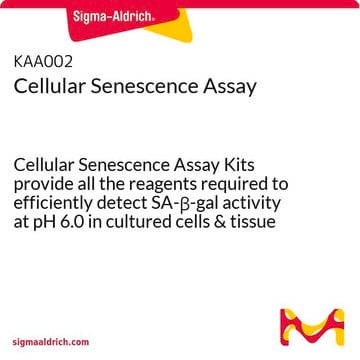238803
Cdk2 Inhibitor III
The Cdk2 Inhibitor III, also referenced under CAS 199986-75-9, controls the biological activity of Cdk2. This small molecule/inhibitor is primarily used for Phosphorylation & Dephosphorylation applications.
同義詞:
Cdk2 Inhibitor III, 2( bis-(Hydroxyethyl)amino)-6-(4-methoxybenzylamino)-9-isopropyl-purine, CVT-313, 2(bis-(Hydroxyethyl)amino)-6-(4-methoxybenzylamino)-9-isopropyl-purine, CVT-313
登入查看組織和合約定價
全部照片(1)
About This Item
推薦產品
品質等級
化驗
≥98% (HPLC)
形狀
solid
製造商/商標名
Calbiochem®
儲存條件
OK to freeze
protect from light
顏色
white
溶解度
DMSO: 10 mg/mL
運輸包裝
ambient
儲存溫度
2-8°C
InChI
1S/C20H28N6O3/c1-14(2)26-13-22-17-18(21-12-15-4-6-16(29-3)7-5-15)23-20(24-19(17)26)25(8-10-27)9-11-28/h4-7,13-14,27-28H,8-12H2,1-3H3,(H,21,23,24)
InChI 密鑰
NQVIIUBWMBHLOZ-UHFFFAOYSA-N
一般說明
A cell-permeable purine analog that acts as a potent, selective, reversible, and ATP-competitive inhibitor of Cdk2 (IC50 = 0.5 µM for Cdk2/A and Cdk2/E; 4.2 µM for Cdk1/B; 215 µM for Cdk4/D1). Inhibits other kinases only at much higher concentrations (IC50 >1.25 mM for MAPK, PKA, and PKC). Shown to induce tumor cells growth arrest (IC50 = ~1.25-20 µM) in vitro and prevent neointima formation in vivo.
A cell-permeable purine analog that acts as a potent, selective, reversible, and ATP-competitive inhibitor of Cdk2 (IC50 = 0.5 µM for Cdk2/A and Cdk2/E; 4.2 µM for Cdk1/B; 215 µM for Cdk4/D1). Inhibits other kinases only at much higher concentrations (IC50 >1.25 mM for MAPK, PKA, and PKC). Shown to induce tumor cells growth arrest (IC50 ~1.25-20 µM) in vitro and prevent neointima formation in vivo.
生化/生理作用
Cell permeable: yes
Primary Target
Cdk2/A, Cdk2/E
Cdk2/A, Cdk2/E
Product competes with ATP.
Reversible: yes
Target IC50: 0.5 µM for Cdk2/A and Cdk2/E; 4.2 µM for Cdk1/B; 215 µM for Cdk4/D1
包裝
Packaged under inert gas
警告
Toxicity: Carcinogenic / Teratogenic (D)
重構
Following reconstitution aliquot and freeze (-20°C). Stock solutions are stable for up to 3 months at -20°C.
其他說明
Bhattacharjee, R.N., et al. 2001. Mol. Cell. Biol.21, 5417.
Brooks, E.E., et al. 1997. J. Biol. Chem.272, 29207.
Brooks, E.E., et al. 1997. J. Biol. Chem.272, 29207.
法律資訊
Sold under license of U.S. Patents 6,617,331 and 6,803,371.
CALBIOCHEM is a registered trademark of Merck KGaA, Darmstadt, Germany
儲存類別代碼
11 - Combustible Solids
水污染物質分類(WGK)
WGK 1
分析證明 (COA)
輸入產品批次/批號來搜索 分析證明 (COA)。在產品’s標籤上找到批次和批號,寫有 ‘Lot’或‘Batch’.。
Haitao Liu et al.
Journal of virology, 95(12) (2021-04-02)
Hepatitis B virus (HBV) capsid or core protein (HBc) consists of an N-terminal domain (NTD) and a C-terminal domain (CTD) connected by a short linker peptide. Dynamic phosphorylation and dephosphorylation of HBc regulate its multiple functions in capsid assembly and
Sungsoo Kim et al.
Scientific reports, 12(1), 16810-16810 (2022-10-08)
External signaling controls cell-cycle entry until cells irreversibly commit to the cell cycle to ensure faithful DNA replication. This process is tightly regulated by cyclin-dependent kinases (CDKs) and the retinoblastoma protein (Rb). Here, using live-cell sensors for CDK4/6 and CDK2
Tom Kaufman et al.
Nature communications, 13(1), 2725-2725 (2022-05-19)
While multiplexing samples using DNA barcoding revolutionized the pace of biomedical discovery, multiplexing of live imaging-based applications has been limited by the number of fluorescent proteins that can be deconvoluted using common microscopy equipment. To address this limitation, we develop
Arnav Moudgil et al.
Cell, 182(4), 992-1008 (2020-07-28)
Cellular heterogeneity confounds in situ assays of transcription factor (TF) binding. Single-cell RNA sequencing (scRNA-seq) deconvolves cell types from gene expression, but no technology links cell identity to TF binding sites (TFBS) in those cell types. We present self-reporting transposons
我們的科學家團隊在所有研究領域都有豐富的經驗,包括生命科學、材料科學、化學合成、色譜、分析等.
聯絡技術服務








